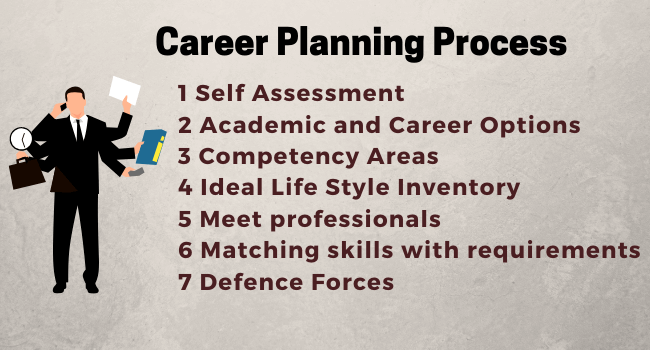
The Career Planning Process includes the best 7 steps.
Choosing a career is a difficult matter, in the best of times. Add to this opinions of friends and parents, and the young person is caught up in a confusing situation where making a decision is almost impossible.
Let’s get started with the Career Planning Process!
We give here a model which can help young people to choose a career, gain the competencies required for it, make decisions, set goals and take action. The decision for each individual is different since everyone is a distinct individual. This model is helpful not only for freshers but also throughout one’s life.
1. Self Assessment
This step involves gathering information about yourself to make a decision about a career. By developing an understanding of self (values, interests, aptitudes, abilities, personal traits, and desired lifestyle) you should become aware of the inter-relationship between self and occupational choice.
One can start by (a) Learning interests, abilities, skills, and work values, (b) Listing accomplishments, (c) Understanding physical and psychological needs, (d) Assessing aspirations and motivation level, and (e) Deciphering personal traits and characteristics.
As you begin to develop a better understanding of yourself, you will gain self-awareness, improve self-confidence, understand the importance of time management and also develop personally as well as professional management skills.
Some ways in which self-assessment can be done are described here. For example, one can take exploratory classes or attend workshops for study skills, or join activity clubs or professional clubs. One must be careful that one should allow regular time for leisure, hobbies and friends and not get involved in work all the time.
One should identify one’s personality style and see what one is best suited to. Also, identify work values and gain a positive attitude. For instance, one should develop interpersonal skills in expressing feelings and ideas and interact with people. Self-defeating behaviour should be got over with.
2. Academic and Career Options
After you have completed your self-assessment, you must identify the academic and career options available. This step allows you to investigate the world of work, narrow a general occupational direction into a specific one through an informed decision-making process.
You will begin to identify potential careers, gather information about those careers, and match the career information with the results from your self-assessment.
Once this is done, one should learn about academic and career entrance requirements. Explore how and where you can get the education and training required. Identify institutes where you want to apply. Also, assess job market trends and have a second plan ready, consisting of academic and career alternatives.
3. Competency Areas
It is important to improve competency all the time. One must gain research and investigative skills, practice decision-making, develop problem-solving skills and take up critical thinking exercises.
One must also increase understanding of how abilities, interests, and values match career/academic requirements.
To gain competency, one should interact with professionals, meet academic advisors and career counsellors, discuss with professors, or attend courses and workshops in areas where one can learn skills. That can be thus acquired are communications, computer knowledge, foreign languages, and international studies.
A youngster must make it a point to attend job and career fairs, participate in the Study Abroad program, or take up a part-time job. Students abroad are known to start small businesses in order to enhance their skills.
The next step helps you to evaluate occupational choices and gain practical experience through internships, co-operative education, summer jobs, volunteer work and campus activities.
You will begin to make more specific decisions about occupational choices. Here too, increase your competency levels by learning communication and interpersonal skills. Confidence-building is very important at this stage. Time management techniques should also be picked up.
At this stage too, one should participate in the Alumni programs of your college, work part-time or during summer to acquire new skills and practice public speaking in classes or in organizations, tutor students in various subjects, or join a professional organization.
4. Ideal Life Style Inventory
Mark each item that best describes how important these things are to you. This inventory is designed to help you identify values. It is not scored.
Live in a House: Very Important Moderately Important Not Important
Live in a Rural Area: Very Important Moderately Important Not Important
Entertain at Home: Very Important Moderately Important Not Important
Spend Money: Very Important Moderately Important Not Important
Frequent Travel: Very Important Moderately Important Not Important
Have Many Possessions: Very Important Moderately Important, Not Important
Have Lots of Money: Very Important Moderately Important, Not Important
Live Close to Recreation: Very Important Moderately Important Not Important
Live Near Cultural Centres: Very Important Moderately Important Not Important
Access to Movies, Restaurants: Very Important Moderately Important, Not Important
Time Alone: Very Important Moderately Important, Not Important
Active Member in Community: Very Important Moderately Important, Not Important
Access to Education: Very Important Moderately Important, Not Important
Live Near Place of Work: Very Important Moderately Important Not Important
Work Only for Money: Very Important Moderately Important Not Important
Once you have answered the questions above, you will be in a good position to select the job you want. Of course, it is not always possible to get a job that perfectly matches what you have in mind.
Allow yourself to dream, fantasise, and have fun. Project yourself into the future, five to seven years from now. Imagine in a two-day time span what you would ideally be doing.
Talk about where you would be living and who else might be there. Use as much detail as possible in your fantasy; the weather, lifestyle, co-workers, leisure activities, responsibilities, etc.
5. Meet Professionals
Now start finding out about your occupational prospects. Find out about the major duties and responsibilities involved, products made or services provided by this occupation, specialization within the occupation and the tools used in the occupation.
Find out also about the education, training or experience needed for the occupation. Match personal qualifications, skills, and abilities required for the occupation and fill in the gaps where you do not have such skills, such as typing or computer knowledge.
Assess whether you like the working conditions: some jobs may require odd hours of duty or frequent travel. Are you up to face these? Find out about future prospects and outlook for the occupation. However, the normal methods of entry into the occupation will be found in newspapers and magazines.
Observe the people in the occupation and see the personality characteristics of typical people working in it. Sales jobs, for example, require extroverts and you should be able to match your personality with what you observe.
Make an informational interview questionnaire and talk to people in the occupation. The following questions could act as a guide:
- How did you get into this occupation/organisation?
- How did you become interested in this occupation/organisation?
- What entry-level jobs might qualify a person for this field?
- What is the progression of jobs from the beginning to the top?
- What responsibilities and duties do you have in your work?
- Who are your customers? Who are your competitors?
- What essential abilities are needed to do your job well?
- What preparation, education, training, or background is required for entrance into this field of work?
- What is the guiding philosophy of the organization?
- What personal traits, values, and interests are necessary or to succeed and advance in this occupation/organisation?
- What are the major frustrations, annoyances, or sources in the occupation/organization?
- How much time do you spend at work?
Meeting professionals helps a lot and clarifies many doubts in one’s mind. However, it is necessary to know someone for an honest answer. If you do not know a person, chances are that you will not be able to get honest answers.
6. Matching Skills with Requirements
The basic idea of the above model is to match one’s skills with what is required for the job. Once an assessment is made, one will be better able to know one’s personality and choose a career accordingly. Very often, this is not done. Thus, people find themselves in jobs in which they have no interest.
A person who has been involved in books all his life is suddenly asked to deal with customers or a person who has been an extrovert may find himself in a banking job where all he has to do is keep ledgers. It is to avoid this kind of thing that building inventory helps.
At the same time, the model helps you assess the skills needed to work in certain careers. If you want to do management, for example, it is advisable to take up jobs so that one acquires confidence and also knowledge about the industry. This will also help in selecting the kind of industry that you want to work in.
The model is not perfect, but gives invaluable pointers about one’s personality and indicates how to choose a career.
7. Defence Forces
Armed Forces offer excellent career opportunities to the enthusiastic and adventurous young candidates who wish to excel in the uniformed forces. Therefore, The career provides very good openings for physical fitness, adventure, and sporting opportunities on the one hand and good prospects of growth in service, new challenges, attractive salary and perks, and the satisfaction of defending the borders of the country on the other.
Every selected candidate has to undergo rigorous pre-commissioning training before induction into the service as an officer in the rank of Second Lieutenant (Army) or Acting Sub-Lieutenant (Navy) or Pilot Officer (Air Force), as the case may be. Facilities like free medical aid, concessional residential accommodation, free rations, free/concessional travel by rail, group insurance, Defence Service Officers Provident Fund (DSOP), etc, are also available.
The defence officers also get adequate opportunities to undergo specialist training courses like Driving and Maintenance Course, Course on Marine Diving, Parachute Jumping and Sky Diving Course, Mountaineering Course, etc, in addition to routine professional courses. In addition, sufficient opportunities are also available to pursue interests in activities like sports both indoors and well outdoors.
Time-bound promotions and increments are available up to a particular limit and the officers with outstanding performance during the entire service career may hope to rise to the highest rank in the respective service.
It also enables a service officer to get an opportunity to carry out several acts of gallantry and get rewarded with decoration from the President of India. Moreover, the service offers a very good social and regimented life along with the pleasure of directly defending one’s motherland.
Which student is this article useful for?
- 10th Pass Student
- 12th Pass Student
- ITI or Diploma Student
- Under-Graduate Student
- Graduate and Post Graduate Aspirant and
- All Fresher Candidates
Thank you for reading “Career Planning Process “. We hope by reading this article, you surely do better plan for your career. If you need any help regarding your career, please ask in comment.

